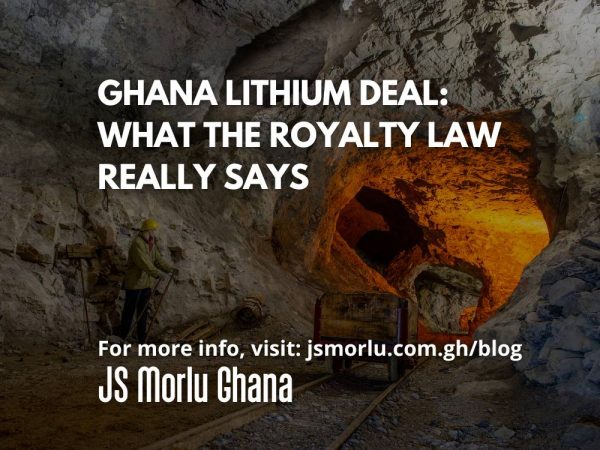Ghana’s renegotiated lithium mining lease has finally reached Parliament after months of anticipation. The document is now with the Committee on Lands and Natural Resources, where it will undergo scrutiny before any debate or ratification on the floor of the House.
But what exactly is delaying the process, and what does the law truly say about royalty rates for lithium?
This knowledge-based guide breaks down the legal framework, the evolving fiscal terms, and what it all means for Parliament, investors, and communities.
Why Parliament Is Moving Slowly And Why It Matters
According to committee chair Collins Dauda, the group is in no rush to approve the lease without full stakeholder engagement. The ongoing 2026 budget debate has also shifted parliamentary attention, meaning the lithium agreement may only return for approval next year.
While slow, this deliberate pace is important. Ghana’s natural resource governance has historically suffered from poor tracking and utilisation of mining revenues. Public scrutiny, therefore, is essential.
What Changed in the Renegotiated Lease?
When the first agreement was signed in 2023, Ghana secured:
- 10% royalty rate
- 1% of total revenue for a Community Development Fund
- 13% free carried interest
- Ground rent, mineral rights fees, a growth and sustainability levy, and a 35% corporate income tax
Together, these terms were expected to give Ghana an effective tax rate of about 58%.
However, at a media briefing on 25 November 2025, the committee revealed a key change:
The royalty rate had been removed from the lease and replaced with the phrase:
“The Company shall pay to the Government royalty as prescribed by law.”
According to the committee’s majority, the “rate prescribed by law” is 5%, referencing a 2010 amendment to the mining legislation.
This has raised questions about whether Parliament must amend the mining laws before a 10% royalty can be applied to lithium.
What the Law Actually Says A Simple Breakdown
To understand the debate, here’s a clear summary of the legal framework:
1. Minerals and Mining Act, 2006 (Act 703)
Originally set royalties between 3% and 6%.
2. Minerals and Mining (Amendment) Act, 2010 (Act 794)
Fixed the royalty rate at 5%.
3. Minerals and Mining (Amendment) Act, 2015 (Act 900)
This is where the confusion often starts.
Act 900:
- Repealed the 2010 amendment (Act 794)
- Introduced a system where royalty rates are set “as prescribed” through ministerial regulations
- Included a savings clause allowing the 5% rate to continue only until changed
So, the 5% royalty is not a mandatory fixed rate.
It is simply the current default rate until new regulations or a negotiated rate (approved by Parliament) replaces it.
Can the Minister Negotiate a Higher Royalty for Lithium?
Yes, according to a widely accepted interpretation of Act 900.
The law allows the Minister responsible for lands and natural resources to negotiate special royalty rates for specific minerals or leases, as long as Parliament ratifies the agreement.
This means:
- Ghana can apply a 10% royalty to lithium
- Parliament does not need to amend the law for a single project
- The 5% remains the general rate, but the lithium mine could be treated as a special case
Lithium is a new and highly valuable resource. Many experts believe it is reasonable for Ghana to negotiate higher royalties than those applied to gold or other long-standing minerals.
What Are Ghana’s Options Now?
Policymakers must choose between three paths:
1. Amend the law and increase royalties for all minerals
E.g., raise the general rate from 5% to 10% or 12%.
2. Create a royalty range (e.g., 5%–12%)
This would allow the Minister to negotiate based on the mineral type and project conditions.
3. Keep the current 5% but apply 10% for lithium only
Parliament can ratify the special rate in the lithium lease without changing the law for other minerals.
Why the Mixed Explanations Are Causing Concern
Although the committee insists there will be full deliberation and no hasty approval, conflicting public statements about Ghana’s royalty laws create uncertainty.
Such uncertainty may:
- Discourage potential investors
- Slow down project timelines
- Affect communities waiting for relocation or economic activity
The people of Ewoyaa, where the lithium project is located, remain in limbo as mining activities are delayed and local economic movement remains on hold.
Conclusion: Ghana Needs Clear, Consistent Policy Communication
Ghana stands at a crucial moment as it seeks to enter the global lithium market, a rapidly growing sector driven by electric vehicles and renewable energy storage.
But to fully benefit, the country needs:
- Clear legal interpretation
- Transparent communication
- Consistent policy decisions
- Timely parliamentary processes
Understanding the true legal framework behind royalty rates is essential not just for policymakers, but for investors, communities, and the broader Ghanaian public.
